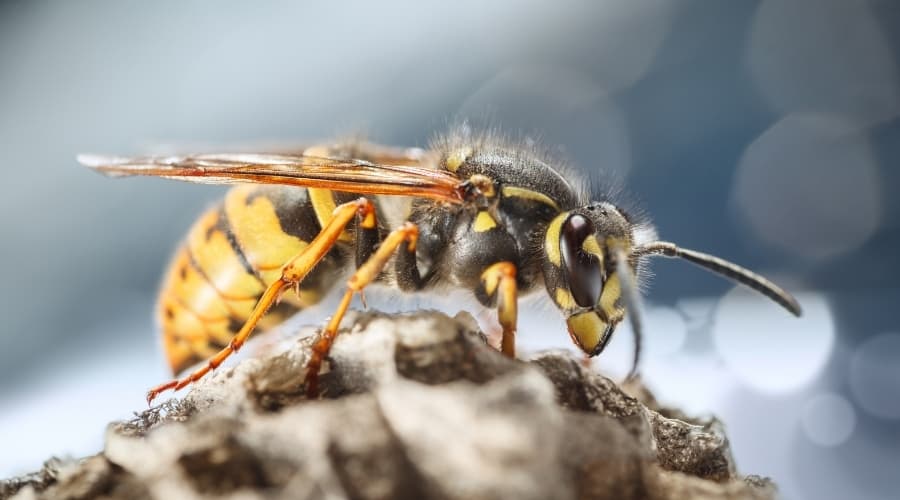Every spring, new queen wasps emerge to start new colonies, and every autumn, all the worker wasps die. Despite their short lives, wasps can handle some surprisingly rough situations.
A wasp can even survive its own decapitation, but what about other extreme circumstances. How long can a wasp live in a vacuum?
A wasp can live in a vacuum between 2 days and up to a month. A vacuum will still contain the air needed for the wasp to breathe, so all it needs is food and water. They can live up to 10 days without water, and if there is food inside the vacuum, they can survive closer to 30 days.
Table of Contents
How Long Can A Wasp Live In A Vacuum Cleaner
Part of the problem with using your standard household vacuum cleaner to suck up wasps is the issue with food.
Assuming it doesn’t kill them right away, and you should assume it won’t, they are mostly stuck in the bag or canister. However, many homes use vacuum cleaners to pick up sugary messes.
From a toddler’s honey nut cheerios to an adult’s spilled sugar from their coffee, it is easy to hand the wasps food without realizing it.
So long as they have food and water, they’ll live a long natural life. Even without water, some wasps can live in a vacuum cleaner for more than a week. According to Gear Trench, wasps will live up to ten days.
How Long Does It Take A Trapped Wasp To Die
Being trapped is only a moderate problem for a wasp. These incredibly tough creatures can survive losing their own heads and still live for weeks. Being stuck in a cup, or your Kirby isn’t going to stop a wasp.
Disposing of wasps trapped in a vacuum can be dicey as well. Whether you have a solid container vacuum or a bag version, it doesn’t matter.
Either way, you’ll have to open the vacuum up to let dirt and wasps out.
Can Wasps Survive In A Vacuum
Wasps will survive in many vacuums. Mostly it depends on the way your machine is set up.
For example, some vacuums have filters that will hold the wasps in place until the vacuum is turned off. In this case, you will immediately have a problem when you turn the vacuum off.
The wasps will still be alive inside vacuums with a hose that leads directly into the chamber. Moreover, they may find a way out by passing back through the tube later.
However, vacuums with a spinning part, such as you find at floor level, will be harder on the wasp. Nevertheless, they will survive the trip, with the only likely damage being to their delicate wings.
Will A Vacuum Kill A Wasp Immediately
A vacuum will not immediately kill a wasp. There are significant advantages to being an insect, such as having a keratin-based exoskeleton. Wasps are surprisingly resilient.
A better option would be to install a RESCUE! TrapStik for Wasps from Amazon.
This chemical-free option will trap wasps firmly without the need for you to get within stinging range. Best of all, this product has a clever bird guard that prevents small animals from getting trapped.
- Eliminate Wasps – Our exclusive VisiLure technology lures wasps, red wasps, mud daubers, and carpenter bees with appealing colors and a multi-dimensional pattern. Once attracted, they become stuck to the sticky surface and expire.
- Visual Attractant – The targeted insects are naturally lured to the trap without odors, chemicals, or wasp sprays. It catches queens and workers, from spring through fall.
- Thoughtful Design – Our unique Glue Guards create a barrier around the sticky trap surface to reduce the chances of non-insect catches.
- Prevent Damage – Mud daubers (mud wasps, dirt daubers) and carpenter bees can cause serious property damage. Our TrapStik can stop this before it starts, without the use of potentially harmful sprays or chemicals.
- Made in the USA – At RESCUE!, our goal is to design, manufacture, and market the safest and most effective pest control solutions available for homeowners. We are proud to manufacture our products in the USA!
Last update on 2024-04-26 / Affiliate links / Images from Amazon Product Advertising API
Bug Vacuums
There are products called bug vacuums, but they have several disadvantages when it comes to killing wasps. First, most bug vacuums are designed as a no-kill solution.
Second, you typically have to suck up just one bug at a time, which can leave you exposed to other wasps in the area.
Third, a wasp still won’t die inside for several days at least, and you will eventually have to empty the vacuum.
Can A Wasp Get Out Of A Vacuum
A wasp cannot climb or fly out of an active vacuum. However, once the suction is gone, these agile features can escape through surprisingly small openings. There are better ways to prevent wasps around your home.
Below is a quick list to help you avoid wasps, so you don’t need to vacuum them up later.
- Plant or hang spearmint leaves. Wasps dislike this plant and may avoid it.
- Wasps also dislike eucalyptus, lemongrass, and thyme. Planting things they don’t want to be near is a smart and simple solution.
- Place decoy wasp nests. Wasps don’t play well with others and will avoid nesting too close to another colony.
- Ensure your yard is clean and trash containers are well sealed. Wasps like the sugar and insects found in human trash.
- Call a professional. Pest control can handle those wasps for you.
- Set traps like the RESCUE! TrapStik for Wasps.
- Seal off any holes that wasps could use to create a nest in the walls.
Will A Wasp Die In A Vacuum
If you are brave enough or desperate enough to grab a vacuum or shop vac to get rid of a nest of wasps, it will get most of them inside.
The suction is more than sufficient to trap wasps. However, they will not die because you vacuumed them up. The only ‘vacuum’ that’s guaranteed to kill a wasp is the vacuum of space.
If you want to kill the wasps, you will need a wasp killing agent inside the vacuum. You could spray wasp killer inside the container and hose before you begin.
However, if you choose this route, please wear protective gear to avoid inhaling or touching the chemicals. Moreover, you’ll need to clean the vacuum well when you’re done.
Can You Vacuum A Wasp
You can vacuum a wasp. Sadly, this is not the most optimal solution. At worst, you can kill a wasp which, as Independent states, will release chemicals telling other wasps in the area that there’s a problem.
This can cause more wasps to swarm to you.
If you manage to trap wasps in a vacuum, you have a vacuum full of mostly live wasps. This is not a great solution.
You could plug up the hose and cover the bottom but waiting for wasps to die on their own can take days or weeks.
Helpful Tips To Know About How Long A Wasp Can Live In A Vacuum
Vacuuming wasps is a possibility, but it is not a smart solution. If you have dead wasps on a windowsill or the floor, then grab your shop vac, but otherwise, there are better and safer solutions.
Here are some helpful tips to know about how long a wasp can live in a vacuum.
- If you plan to vacuum wasps, use a shop vac. Before going after the wasps, put a solution of soapy water inside, the soap will break the water’s surface tension, and wasps will sink and drown fairly quickly.
- Dustbusters and other vacuums with tubes leading directly to and from the storage area will suck up a wasp, but it will not hold it once the machine is off.
- A single wasp in the house is not the same as a nest. To vacuum a whole nest, you need to get close to the nest and will likely get stung. If you must do this, do it at night.
- Wasps are more aggressive in late summer and early autumn. Take the time to deal with wasps early in the season, so you don’t have to vacuum more agitated and violent wasps.
Final Thoughts
Vacuuming wasps is never the best solution. However, you sometimes have to work with what you’ve got. Sadly, wasps can live days or weeks inside your vacuum, longer if there’s food inside.
Avoid killing wasps outright by squishing because it will alert other wasps in the area and choose a shop vac full of soapy water.
If you go after wasps early n the season and only after dark, you are the most likely to succeed at vacuuming them up without getting stung, but it’s always a risky situation.
Whenever possible, set traps or call a professional instead.


